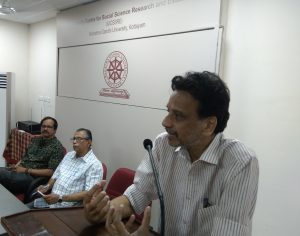
There is an increasing trend of fiscal centralization in India’s federal setup despite constitutional provisions for power and resource sharing, according to Sri. R. Mohan, Senior Consultant at the Gulati Institute of Finance and Taxation (GIFT) and Visiting Fellow at the Centre for Development Studies (CDS). He was delivering a special lecture on “India’s Federal Setup: Trends of Waxing and Waning,” jointly organized by the K.R. Narayanan Chair for Human Rights and Social Justice and the Inter University Centre for Social Science Research and Extension (IUCSSRE) at Mahatma Gandhi University.
Mohan noted that while political decentralization was visible during the coalition era of the 1990s and early 2000s, fiscal policies have increasingly favoured central authority. The rising share of non-divisible surcharges and cesses in the Gross Tax Revenue of the Union government has limited the resources available for states, despite Finance Commission recommendations for higher revenue shares. This shrinking divisible pool has deepened vertical fiscal imbalances, making states more dependent on the Centre.
Tracing historical trends, Mohan pointed out that the 1950s were marked by strong centralization, with the Congress party dominating both the Centre and states. The 1960s saw early tensions in Centre-state relations, particularly after the 1967 elections, when non-Congress governments emerged. However, the Centre retained financial control through centrally sponsored schemes and the Planning Commission. The 1970s witnessed a renewed assertion of central authority under Indira Gandhi, with frequent use of Article 356 to dismiss opposition-led state governments, further limiting state autonomy.
Discussing the erosion of cooperative federalism, Mohan argued that unilateral fiscal decisions by the Centre—such as increasing surcharges and cesses—have reduced the financial independence of states. This trend has strained Centre-state relations and hindered the ability of states to effectively manage their own finances and development programs.
Mohan also highlighted the problems posed by GST, particularly for Kerala, and here the enforcement mechanisms remain a major challenge. While GST was introduced to simplify taxation, it has instead weakened state autonomy by making states more reliant on the Centre. Kerala, a consumption-driven state, struggles with GST revenue disparities, further worsened by non-divisible cesses and surcharges. Weak enforcement mechanisms limit Kerala’s ability to tackle tax evasion and fraud, while key enforcement powers remain with the Union government. The one-size-fits-all approach of GST disadvantages service-heavy states like Kerala, restricting their fiscal flexibility.
Mohan called for stronger enforcement tools, greater state control over tax rates, and improved revenue-sharing formulas to restore fiscal balance and strengthen federalism. The session was chaired by Dr. V. Mathew Kurian, and Dr. Rajesh Komath, Dr. K.M. Seethi, Dr. A.M. Thomas, Dr. Murali, Dr. Jose N., Dr. Rajesh Mani, Dr. Dinoop, and others spoke.